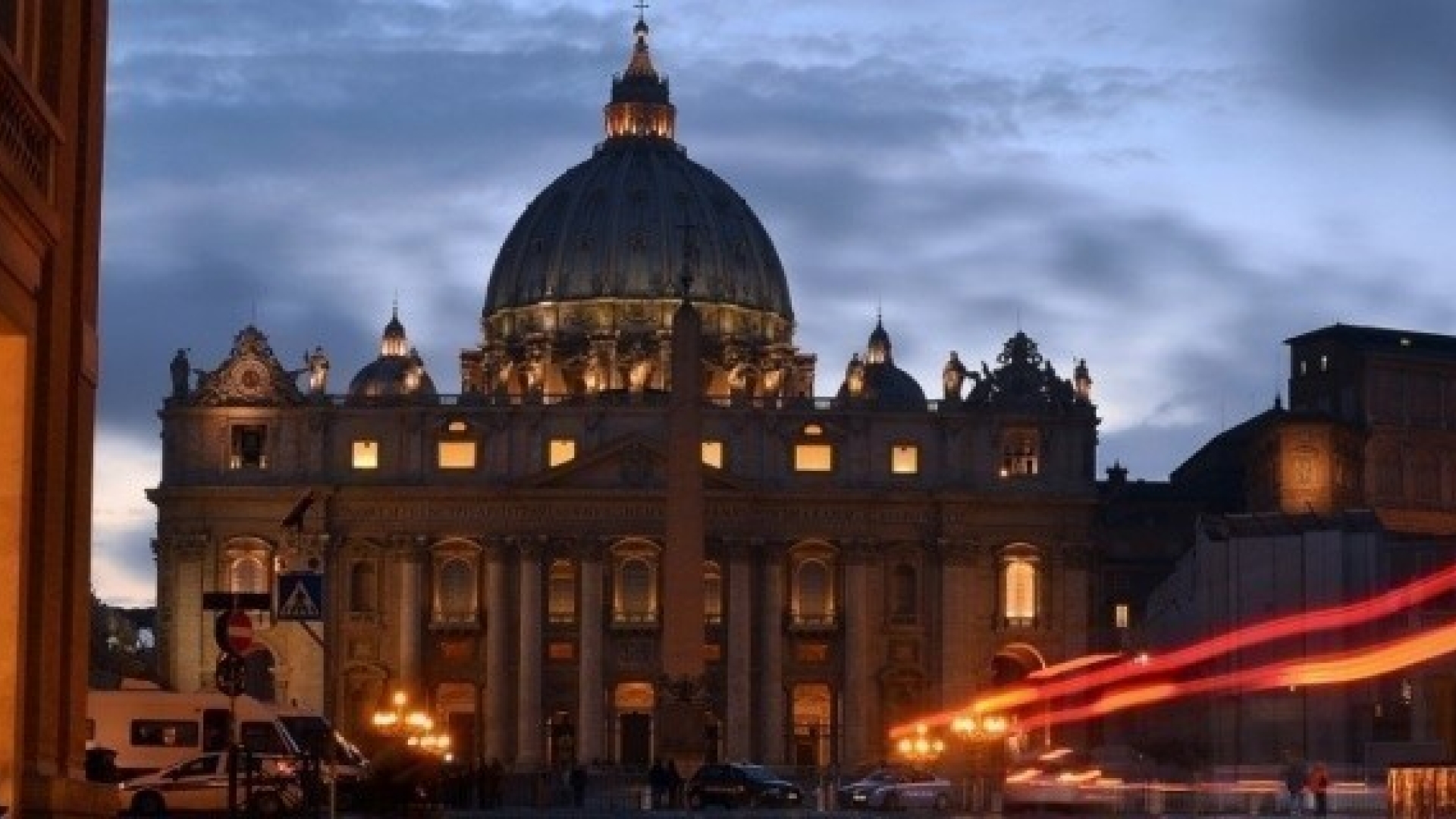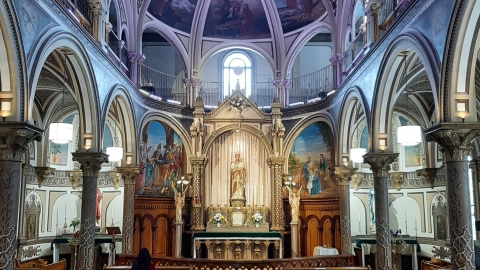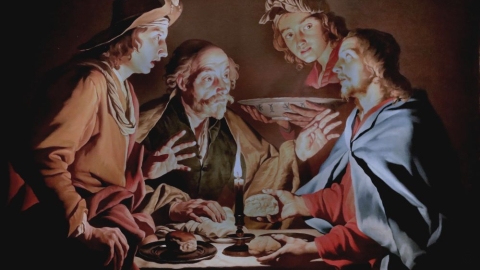Character and Mission of the City of God

About some more profound views on the character and mission of the City of God
It would be an essential work to discover, as far as it is possible for a man to do, the views of Providence in these persecutions unleashed against the Church. One would see that every attack brings about a triumph; every error produces the development of truth, and every crime gives birth to expiation and provokes the reaction of a virtue. For the arm of God to reach out, it is necessary, when the strength of man brings his abilities into play, that a divine force makes the Church grow under the sword; when darkness threatens to obscure the radiant sun of truth, that truth shines; and when crime is king, then virtue has martyrs. This cannot be our task here; we must limit ourselves to studying this question from a more general point of view.
Two principles dominate the world: dedication and solidarity. With dedication, the inevitable consequences of one's acts fall on the acting being; by solidarity, other implications of the same actions fall not on the acting being but on others who have in common with him their nature, properties, and relations. According to these principles, we must investigate the benefits and advantages of persecution, first regarding the martyrs and then the Catholic Church members.
Of the martyrs, some survive, and others succumb. To those who survive, the heroism of their confession gives, along with the glory of a willing martyrdom, the great virtues that this implies; it brings to its last limits the contempt for possessions, self-denial, and that detachment from all things, the necessary basis of solid characters and brilliant works. To those who succumb, the struggle opens heaven and gives an eternity of glory for a moment of suffering. And what glory! Every drop of blood shed is transformed into precious stones which will adorn the immortal crown of the martyr; every wound which has shed this blood shines with the divine brilliance of heaven; and human nature, already transfigured, sees added to its transfiguration these marvels celebrated by the revelations from heaven.
The Church benefits from these virtues and the glory of her children. Their triumph brings her eminent advantages, whose dogmatic importance and moral effectiveness we must emphasize. It is here that the providential mission of suffering in the Church is particularly evident. Already, the persecution of the sword has given fulfillment to prophecies. Jesus once said: "You will be persecuted for my name's sake, and the time will come when your executioners will think they are serving God by cutting your throats." From the beginning, these words were fulfilled and are still being fulfilled daily.
Secondly, this same persecution makes the divinity of the Church possible through the miracle of its foundation and perpetuity.
Indeed, if the Church, at its origin, had appealed to the lusts of a man and the ambitions of princes, its establishment would not have differed in any way from the always temporary establishment of schism and heresy. It could then have been assimilated, with some appearance of justice, to those famous errors which have seduced humanity for a time, only to cause it, in compensation for a law without sacrifice, embarrassments fraught with disasters. If only, despite her noble disdain for such means of proselytizing, the Church had established herself without question, and if Peter's boat had followed the course of the centuries without encountering storms, this easy establishment would have been attributed to providential harmonies, and this happy navigation to the serenity of heaven or the skill of pilots. On the other hand, the Church began in blood, and Peter's boat sailed only on waves of blood, not the blood of his enemies but the blood of his children. Hardly had it left its cradle, already bloodied by persecution, the furious storm beset it. Christians die by the millions. The Church, nevertheless, spreads under the sword; victorious after three centuries of torments, she wipes her wounds to take revenge on her executioners by receiving them into her bosom.
I know that Sophists have pretended to confirm the probative force of this marvelous fact, believing to explain it by the exaltation of enthusiasm and the interest the halo of suffering gives to a persecuted cause. Wretched subterfuges! The human race will never believe that for three centuries, in all parts of the known world, there have been a prodigious number of people of all ages, sexes and conditions, capable of sacrificing their property, their honour and their lives with joy, out of simple enthusiasm, rather than abandon the doctrine of a crucified Jew. I will also confess for my part that, however much I may consult the principles of a wise philosophy, however much I may gather the lessons of history, I cannot convince myself that a means of obtaining adherents is to slit the throats of those who speak out and that a cause must succeed if it is to be pursued by iron and fire. The finger of God is here, and if the divine intervention does not appear in such an event, this heroism, which has become common, is indeed the most astonishing of miracles. We must always return to Pascal's words: "I believe witnesses who have their throats cut."
The Church did not suffer only in the first centuries of its history; it suffered throughout its existence. Finding a point in time or space that her blood has not marked is impossible. This undoubted fact makes the perpetuity of the Church miraculous. Statisticians estimate the globe's population at nine to twelve hundred million, and it is certainly going beyond the truth to count the number of members of the teaching Church at one million. This million has in its favour neither the ascendancy of fortune, nor the brilliance of power, nor the force of arms; it is poor, it is weak; and arms, and power, and fortune, are willingly unleashed against its weakness. Despite everything, the Church remains, and empires fall. I am not speaking of the kingdoms of antiquity which crumble with such frightening rapidity around the national land of the Jews; I am speaking of the modern States. None goes back eighteen centuries, none that has not changed dynasty, and none that has not undergone profound revolutions. However, bishops succeed, Roman pontiffs follow pontiffs, and Peter commands the waves shaking the world from his boat. Not only does the Church resist the shock of destruction, but she remains fruitful. Coming out of the East, she visits, like the sun, all the regions of the earth without forgetting the poles. To speak here only of its benefits poured on our Occident, it is this which penetrates with a breath of life Rome in its decadence: she who civilizes the Barbarians, she who constitutes the Christian society of the Middle Ages; she who raises science to the most sublime heights, she who crowns with masterpieces the arts and national literature; and who gives, in modern times, to every wound a physician, to every great aspiration a goal and a direction; she, finally, who will survive under other skies, when, on the solitary ruins of our cities once full of people, the Jeremiahs of another age will come to say: There lies Lacedemona, Athens was here! Such is the providential mission of the persecution of the sword in the Church. The persecution of pride has its function but in another order of ideas. It makes visible the double miracle of the world's preservation and development of truth.
First of all, the miracle of its preservation. Have you ever seen, amid torrents of rain, gusts of wind, bursts of thunder, in the deep darkness of a stormy night, a poor traveller, weighed down by the burden of years, carrying a torch with a trembling hand? If the torch did not go out, God protected the poor traveller. This old traveller represents the Church. Her torch is the immutable symbol of the mysteries. She carries this torch, not one night, but thousands of nights; she has it, not from cottage to cottage, but from empire to empire, from world to world. Always the gusts of heresy, the blasts of philosophism and the thunder of revolutions threaten to extinguish it—useless threats. Corruption may raise its dust clouds; pride may heap its mists of sophistry: the fabric is uncovered, the air is purified, and always on the horizon, now serene, the divine torch of the mysteries shines more brightly.
To this miracle is added another no less brilliant: that of the progress of dogma. Without a doubt, Christian doctrine suffers neither growth nor deterioration: it is complete from the beginning and immutable in its duration. Complete in itself, although it never substitutes new dogmas for primitive ones, it nevertheless progresses. This progress is accomplished by giving the ancient truths a more precise expression, defending them with the help of a consecrated formula, and enlightening, by scientific speculation, the luminous faces of the mysteries. The Church, left to her maternal tenderness, would teach with sublime simplicity; her children, on her word, would believe with sublime simplicity: the Church is not a metaphysician, and her children are not disputants. But now error raises its head. The Church strengthens the truth under attack; Christian theological science adds to the force of dogmatic definition, authoritative demonstrations, and the credit of reasoned interpretations.
As soon as Arius appeared, Peter spoke through the mouth of Sylvester, the Council of Nicaea launched its anathemas, Athanasius wrote his admirable treatises, and the august mystery of the Trinity shone with splendour. The other mysteries, objects of the same attacks, obey the same law so that after eighteen centuries of denials which follow one another, the truths defined, defended, interpreted, and demonstrated pour torrents of light on their obscure blasphemers. Outside the Church, therefore, there is some truth; in the Church alone, there remains, amid attacks, the living truth: this is the miracle. In the same way, if there is any virtue outside the Church, only in the Church does virtue flourish; this is a new miracle, which a new form of persecution brings about.
What a miracle, indeed, that this law, so short and so fruitful, of the Decalogue, has been preserved! Since the great catastrophe of Eden, blind, impetuous, insatiable passions have been stirring in man's heart. These passions have accomplices outside and demand odious satisfaction. But the law is there, opposing its precepts. What to do? Hypocrisy interprets the law; violence tramples it underfoot. The Church then rises, condemns the interpretations of pusillanimity jealous of reconciling the respect of duty with its transgression, in appearance at least, and launches the most terrible anathemas against a brutality which believes itself victorious in infamy. At this solemn voice, weakness, astonished at itself, shows itself generous by sighing. Still, violence, for its part, goes away, trampling the body of a martyr underfoot, adding new ignominy to this new crime. Do not be afraid, however. The expiring martyr has let fall from his mouth a supreme protest: Non licet! The Church raises and crowns him; something like remorse awakens; the guilty man humiliates himself; thus, the Church ensures the ineluctable triumph of a law constantly threatened with overthrow.
Far from undermining the law, the attack, on the contrary, strengthens it. The Church would have given its precepts as its teaching, with that authority which does not discuss that simplicity which supposes the adhesion of living faith, and souls, simply heroic, would have submitted without murmuring. Cowardice raises doubts; debauchery raises its dishonourable clamours: responding is necessary. The Church, unchanging in her spirit as in her principles, resolves the difficulties and confounds the indiscreet claims. Thus, the progress of the law is accomplished by the definition of the precept, the adjustment of its requirements to the problems of the times, and bringing to light the profound reasons that demand its maintenance. In this way, the law progresses like dogma, although both remain unchanging. Such are the dogmatical advantages of the struggle in the Church; let us come to the material benefits. The first is to make the copy conform to the original by reproducing in the Church the features of Jesus Christ. As the spouse of a crucified God, the Church cannot live in peace, in a state of intoxication. To her, too, the tribulations of the earth and the injustices of men are necessary. But let us go deeper into the heart of this great mystery.
Persecution is like a storm: the storm purifies the air and prepares for beautiful days; persecution purifies the Church and opens up horizons of happiness. The Church, however, is holy in her head, holy in her law, holy in all her ways: how does she need to be purified? Here it is. Jesus died for all men, and the Church, his legatee, opens her bosom to all through baptism. Unfortunately, cowardice is the appeasement of the many and generosity of a lot of the few. The many fall into sin, and the Church appears less resplendent in purity. These defections were to be deplored, especially when the pagans entered the Church en masse. Now persecution comes, it attracts to itself, by the seductive prestige of its wickedness, the unfortunate whose crimes choked the good grain, precipitating shameful falls in the weak, whose scandals would have been so many sources of corruption; it raises the strong souls to higher virtues, and God's designs are accomplished. The Church has opened her bosom to all men without losing her halo of holiness.
The Church, purified by the fall of some, sanctified by the perseverance of others, is still bursting with joy amid tribulation, thanks to the sacrifices of the martyrs. The day of death is the day of triumph, the crowning of agonies, the succession of which forms the life of the Christian. According to the eloquent expression of the liturgy, it is a day of birth; and the Church, a doubly fertile mother, sees every day the birth in heaven of one of her children, whose remains she will gather up to offer them to the tributes of posterity. Once the storm has subsided, there is a new joy. The Church contemplates with rapture the hair that has turned white in exile, kisses with respect those hands that have worn chains, and bows with admiration before those foreheads bruised by tyranny. O ineffable joys of the Church victorious in the life and death of her children!
But suffering is holy, and martyrdom adds what is lacking to the passion of Christ. Not that this passion, taken in itself, lacks anything, far from it; its price overflows even where iniquity had abounded. Jesus, however, wants the infinite patrimony of graces that he has bequeathed to the world to be further enlarged. Moreover, a finite condition must intervene between Jesus crucified and sinful man to apply this superabundance of graces. Of these conditions, one of the first, after those of divine institution, is suffering and especially suffering raised to the level of martyrdom. Those who offer themselves in sacrifice with the Lamb," said the holy Fathers, "are redeemers with the Redeemer.
How beautiful and fruitful is now the operation of these mediators subordinate to the sovereign mediator! Here they are, this time flooding the earth with a deluge of blood. This blood cries out for vengeance, like that of Abel, but, mixed with that of Jesus, it cries out more loudly for mercy. Its streams flow, therefore, to pay for the sins of the world again; they flow primarily in Rome, the great prostitute, which has served as a sentinel for the abominations of paganism. On the other hand, this bloodshed on all the beaches is an act of taking possession: the earth is God's because he created it, and Jesus's because he sprinkled it with the blood of his children. Would we dare to contest his right to make the cross blossom where they fell under the iron of the executioners? Moreover, this blood was, as it were, transubstantiated by a merciful omnipotence into a germ of life; and always, after the massacres, you see, as Tertullian remarked, generations of Christians blossoming, as one considers buds, the hope of the future, in a forest fallen under the axe. In this new capacity, Rome has the most beautiful share in the immolations; God, who had made it the capital of the old world, calls it to be again the capital of the new, the central seat of the Church, the head and heart of Christianity.
Observation is necessary here to prevent difficulty. More than once, we have seen the blood of martyrs spilled without any Christians sprouting from it. It is perhaps because this crime had attracted the reprobation of the persecuting people, or rather that too little blood had been shed. New apostles come. Their blood, mingled with the blood of their predecessors, will henceforth make the soil fertile and make the hitherto barren land spring forth with fertility.
The world, converted by the blood of the martyrs, does not leap to the purity of the Christian life; it even remains, more or less, the focus of all prevarication. Now, God is justice, and if the drama of human life, unfinished here below, finds its outcome only in the face of eternal justice, the peoples, who cannot as peoples appear before this justice, must see in time that judge which eternity denies them. God reigns, therefore, in heaven and on earth; in heaven, by order of eternal rewards and punishments; on earth, by the punishments inflicted by his secular government. From his jurisdiction rise all empires; in his hand rests the dew of blessings; at his feet, the thunderbolt stirs; and under his gaze, the merits and crimes of the peoples are balanced. When crimes fill the cup of vengeance, God calls his ministers, plague, war, famine, and says to them: go! Epidemic goes forth, pouring poison into the air, and a veil of mourning covers the cities; war hurries empires against empires, and streams of blood are shed; famine dries up the springs of public nourishment, and generations are agitated by the tortures of hunger. But let willing victims fall under the sword: their blood counterbalances the weight of iniquities, the angels cease to pour out the bowls of wrath, and the still magnificent hand of the Most High replaces vengeance with blessings.
Such is the providential mission of the Church in the struggle resulting from the attacks unleashed against the city of God. Would one believe it? A thoughtless or pretentious science has refused to admire these harmonies and raised frivolous objections against a doctrine so just and consoling. But, it says, "persecution causes the Church to lose whole nations; when nations would not succeed, the righteous succumb; and it seems difficult to reconcile with the wisdom of God the triumph of the wicked."
The Church loses nations. - Yes and no. No, a country can only temporarily separate from the Church, which always has children in this particular place. Yes, because grace abandons the unworthy of passing to the more worthy. Thus, to the great heresies corresponds the conversion of the Barbarians; to the Eastern schism, the conversion of the North; to the Protestant Reformation, the discovery of America; finally, to the weakening of the faith in the West, the gradual extension of the Gospel in unfaithful countries. Thus are fulfilled the merciful and just views of this Providence, which gives each people its vocation and proportions its rewards to its fidelity. The righteous succumb. - the righteous, no; the appearance of the righteous, yes. Those who succumb yield as a punishment for their infidelities. If a genuinely righteous person were to prevaricate by supposition, his fall, explicable in principle, would have its purpose in the divine plan to manifest man's weakness. If it were a people, the problem would be complicated, but in any case, it would only be rendered insoluble by the absurdity of the hypotheses.
What can we say about the triumph of the wicked over the servants of God? That the prosperity of the wicked, like that of demons, always has a hidden worm that devours it; that God sooner or later humiliates the persecutors by the definitive triumph of the Church, and that he always lays them to rest on the deathbed, as Lactantius observed. If God sometimes postpones his punishments, it is because he embraces all time, and justice will be done at the solemn sitting of the judgment, where all the mysteries of history will be unveiled.
Such is the condition of the Church here below, and such is the mission of her struggles. Constantly harassed by enemies who are not discouraged by defeat, she presents her bosom to the sword; she preaches her doctrine to pride; she imposes her law on the passions; and always the sword tears at her heart, pride attacks her doctrine, passion violates her law. When a man would destroy her, God raises her and measures the splendour of her victories against the fury of her attacks. The life of the Church is therefore summed up in this short formula: to be a victim, to remain a queen, and to become a mother.
Source : Histoire universelle de l’Église catholique par l’abbé Rohrbacher (Nouvelle édition par Monseigneur Fèvre, protonotaire apostolique), Tome premier, Librairie Louis Vivès, 1901, Considérations générales sur l’histoire de l’Église, Extraits du chapitre onzième, pages 248 à 252.



